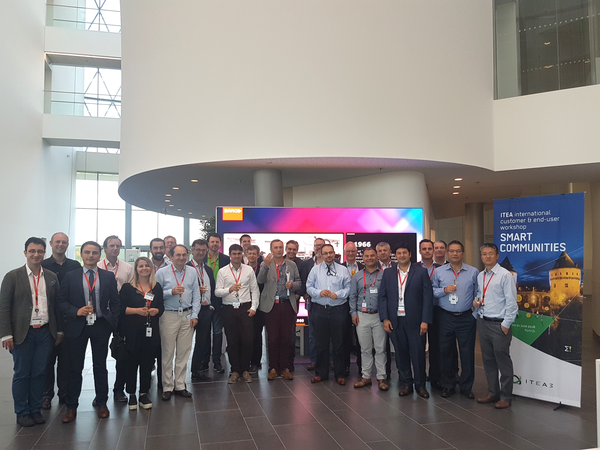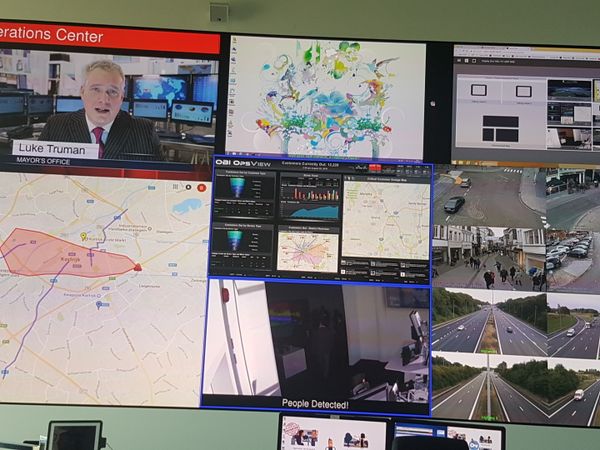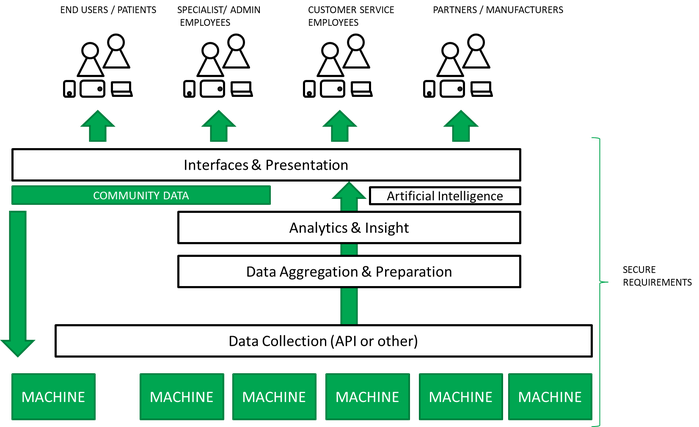Smart Communities challenges: can you solve them?

Download the full report: Results of the ITEA international customer workshop on Smart Communities
Customer orientation and business impact are two key objectives in ITEA; ITEA projects focus on creating real business outcomes and from experience we know that R&D project are more successful in this when they involve customers from the beginning. To facilitate that, ITEA organised its fourth international customer workshop on 20-21 June. This year, the Barco premises in Kortrijk was the venue for the workshop to discuss the challenges of Smart Communities at which a smart set of selected international customers, key technology providers and innovative SMEs gathered from Belgium, Canada, France, Germany, the Netherlands, Sweden and Türkiye. As Smart Communities can be very useful in many cases, there was a wide variety of customers, as you can see in the table below.
| Customers | Technology providers | SMEs |
|
Airbus Cybersecurity (FRA) |
Airbus Cybersecurity (FRA) |
Appnovation Technologies (CAN) |
|
Axians (BEL) |
Barco (BEL) |
Bumbee Labs (SWE) |
|
Koç University (TUR) |
Turkcell Technology (TUR) |
CityzenData (FRA) |
|
Migros Retail (TUR) |
|
Esri (CAN) |
|
Port of Antwerp (BEL) |
|
Immanens (FRA) |
|
Toulouse Oncology Center (FRA) |
|
Inovia (SWE) |
|
Turkcell Academy (TUR) |
|
Nurogames (GER) |
|
S2E Technologies (CAN) |
|
|


The topics discussed in-depth during the meeting were:
- Heterogeneous communities
- Hospital patient journey and apparatus management case
- IoT & Industry monitoring with digital twin case
- Tracking and tracing
- Cooperative learning
- Embedded learning
- Miscellaneous challenges to be discussed further
The rest of this document describes the different exchanges more in details.
We invite you to check this report carefully if you intend to push a new ITEA project on Smart Communities. You will find a set of real customer pain points to be solved.
If you have an innovative idea to solve any (or part) of these challenges, use the ITEA Project Idea Tool (https://itea3.org/getting-started.html) to show your interest and participate in the ITEA Project Outline (PO) Preparation Days, taking place on 4-5 September 2018 in Stockholm, to define your project and gather a suitable consortium!
1. Heterogeneous communities
a. Challenges:
Hospital patient journey and apparatus management case
- Optimise the matrix of workflows, combining the workflows of the patients and the workflows of the key apparatus
- Breaking silos of information between the different services
- Define a common data model to build a global vision (patient, devices usage)
- Dashboard to support decision
- Optimisation tool taking into account all the available data
- We need to build a data lake of the history of the patient treatments and associated results to reuse the diagnostic and chosen protocol to speed up decision for next similar patient
- A challenge is to define which data, when, for what, personalised for each person, manageable in a time window
- Visualisation tools of the data to simplify the decision and avoid known mistakes
- How to mobilise the customers on such a platform
- A maintenance challenge is that heterogeneous components must deliver elements for the dashboard according to their level of risk of breakdown
IoT & Industry monitoring with digital twin case
- A lot of the acquired data is nowadays not used
- First objective of the customers is just to visualise these data
- A sticking point is who can see my data
- Next step will be to do more with the IoT acquired data for predictive maintenance for example
- Heterogeneous data
- A challenge is to have enough situations of failure history as on an actual production line you can’t offer to block the line, so you change the components on a regular basis and don’t have a failure history
- A challenge is to offer decision support tool to a multi-competencies community to balance between maintenance necessity, production turnover, engagement of production in a time window
- Dashboard to support decision
- A challenge is that heterogeneous components must deliver elements for the dashboard according to their level of risk of breakdown
- A challenge is to build trust along the entire supply chain. How to share all the data from the smallest components to the full plane in operation (blockchain, quantum crypto) e.g.
- Work on the reason why the companies and people don’t want to share the data
- Use GIS to gather the data and track the products
- Quality insurance is a tool to enforce access to the data
b. Ideas of solutions:

c. Ideas of project proposals:
- Global (multi-equipment) dashboard for maintenance
- Collect, probe, reduce, deep learning, visualisation
- How to create a smart community to collect the data from all the employees before a problem arises
- Extreme-scale analytics is more than big data for a huge amount of heterogeneous data to optimise and forecast maintenance
- Visualise different source of heterogeneous data on the same GIS representation
- Creating trust between the different actors from the supply chain
- Micro learning to ensure the devices are used in the best way to increase the uptime. Share the best practice
Leader: Immanens
Interested partners: Toulouse Oncology Center, Immanens, Appnovation, Esri, Airbus CyberSecurity, Barco, Bumbee Labs, Turkcell Technology
2. Tracking and Tracing
a. Challenges:
- Track origin of raw materials and all the treatment steps before the final product
- In Pharmacy there is a regulation to track and trace the process
- Cleaning steps of tools are key
- Problem is even more complex when production is organised through a set of distributed plants
- Traceability of the reporting
- Ensure a secured architecture for data acquisition and semi-automatic formal report generation including some forced fields to be delivered continuously to the regulation agencies
- Generate optimisation of the process from the continuous reporting
- Create a smart community decision room to ensure the continuous running of the chain
- Balance with some level of automation as soon as it is possible while keeping flexibility
b. Ideas of project proposals:
- Choose a context with regulation
- Blockchain tracing or any other solution
- Distributed plant
- Access control to the data through report generation with access rules defined to the smallest level of detail
Interested partners: Airbus CyberSecurity, Toulouse Oncology Center, Immanens
3. Collaborative Learning
a. Challenges:
- People leaving a company is a problem; what can be done to avoid losing the knowledge
- There are different high-pressure jobs that generate a high rate of job changes: in sales, call centres, cashiers, ….
- Furthermore, we need people to stay motivated to keep learning, but training can be boring
- Trainee must lead his learning agenda; he must experience his own learning through his own network
- How to seize knowledge from all the written documents and from user experience to build a formal representation of the knowledge at the heart of the companies
- Traditional learning will still remain, but more personalised short training is needed to adapt to dynamic company environment; there is a demand for continuous micro training
- Companies and students are not so keen on online courses; they prefer to be present on the campus!
- Business model for training is not always clear
- There are some cases where you give a training and guarantee for a job. This works for Nano programs. If they cannot find a job, they are refunded
- Udemy is a marketplace with content producers. Udemy checks the content before distributing it. People using the training pay for it and the money is partly returned to the content providers
- If there is marketplace you might get lost. Traditional training provides more structure. Instead of paying for the training you pay for the coaches
b. Ideas for solutions:
- Operational (written) knowledge and experience knowledge; gather these different types of knowledge (AI cognitive) to create a hybrid knowledge
- Cognitive AI is high-level language to interpret unstructured data (NLP)
- Motivating people can be achieved with gamification
- The learning map can provide a solution to structure the learning path for personal training; it can visualise the path towards reaching a certain level of skills
Embedded Learning
a. Challenges:
- Embedded learning is for example:
- Sales and call centres are registering their transactions. There is an opportunity to use this data to generate an actual training rather than just simple feedback
- Nevertheless, evaluation of the quality of transactions remains a challenge
- Another level is to extract some contents for training from the design formalisation of the products and the services semi-automatically. And it can be continuous, following all the modifications of the product design
- For massive training how to ensure heterogeneous terminals, personal needs, understanding for personalised training course, learning analytics, who learns what, where, when and how
- Virtual Reality training has not been so successful until now
- Evaluation of the know-how of the trainees before and after the training / qualification of the trainees remain a problem
b. Ideas of solutions:
- Several solutions already exist e.g. Babel, Udemy, Udacity for learning, but people can get lost. Using a learning map can help to define a learning path.
- Gaming where you intentionally push a user in the wrong direction and get back to him if he takes the wrong decision (e.g. send a mail from a hacking company and register who clicked on it and direct them on a training content to explain to them about protection against phishing).
- Escape room with many security threats. The teams were competing with each other. And afterwards people evaluated it.
c. Ideas of project proposals:
From the two previous challenges an idea of project has been proposed to cover different training tools and knowledge gathering for a set of use cases:
- telcos
- supermarkets
- cyber security
- universities
Leader: Turkcell Technology
Interested partners: Inovia, Appnovation, Koç University, Turkcell Academy, Toulouse Oncology Center, Airbus CyberSecurity, Nuromedia, Barco, Migros, Immanens, Bumbee Labs
Miscellaneous challenges
A set of other challenges has been put on the table but not discussed in detail due to limitation of time. All of them have been expressed by a customer:
- Understanding of personal needs, data analytics to identify people and behaviour in a community
- How to break the silos and browse & visualise heterogeneous data (when you have too many data, too many screens) to build a decision with a multi-competencies team (which data mining on heterogeneous data: image, signal, data, text) especially when a situation goes wrong
- How to build controlled community tools to allow bottom-to-bottom, bottom-up and top-down communication in a secured way (no leakage of information)
- Tracking & tracing: how to master a multi-dimensional optimisation algorithm under the control of a multi-competencies team
- Mission preparation with two teams in competition
- How to co-design and animate open platform with customers, competitors and academics
- How to build and animate a community of customers sharing some best practices, some tool configurations
- How to measure the business case of a smart community value for the customer
- Who pays for a collaborative platform with different companies
- How to build the trust
- Secured data sharing
- Secured document sharing
- Some cities don’t have decent IT support yet; it requires a concept of virtual cities as a service
- New education scheme for remote patient and professionals
Conclusion
Once again, this international customer workshop demonstrated its added value to support the ITEA Community to be even more customer-oriented and to work on actual challenges coming from their future customers.
Join our next ITEA PO Days on 4-5 September in Stockholm and pick a challenge described in this document; you can be sure you will respond to real demands of actual customers. We look forward to discovering new unique innovations!
For more information and registration: https://itea3.org/podays2018/po-days-2018.html

